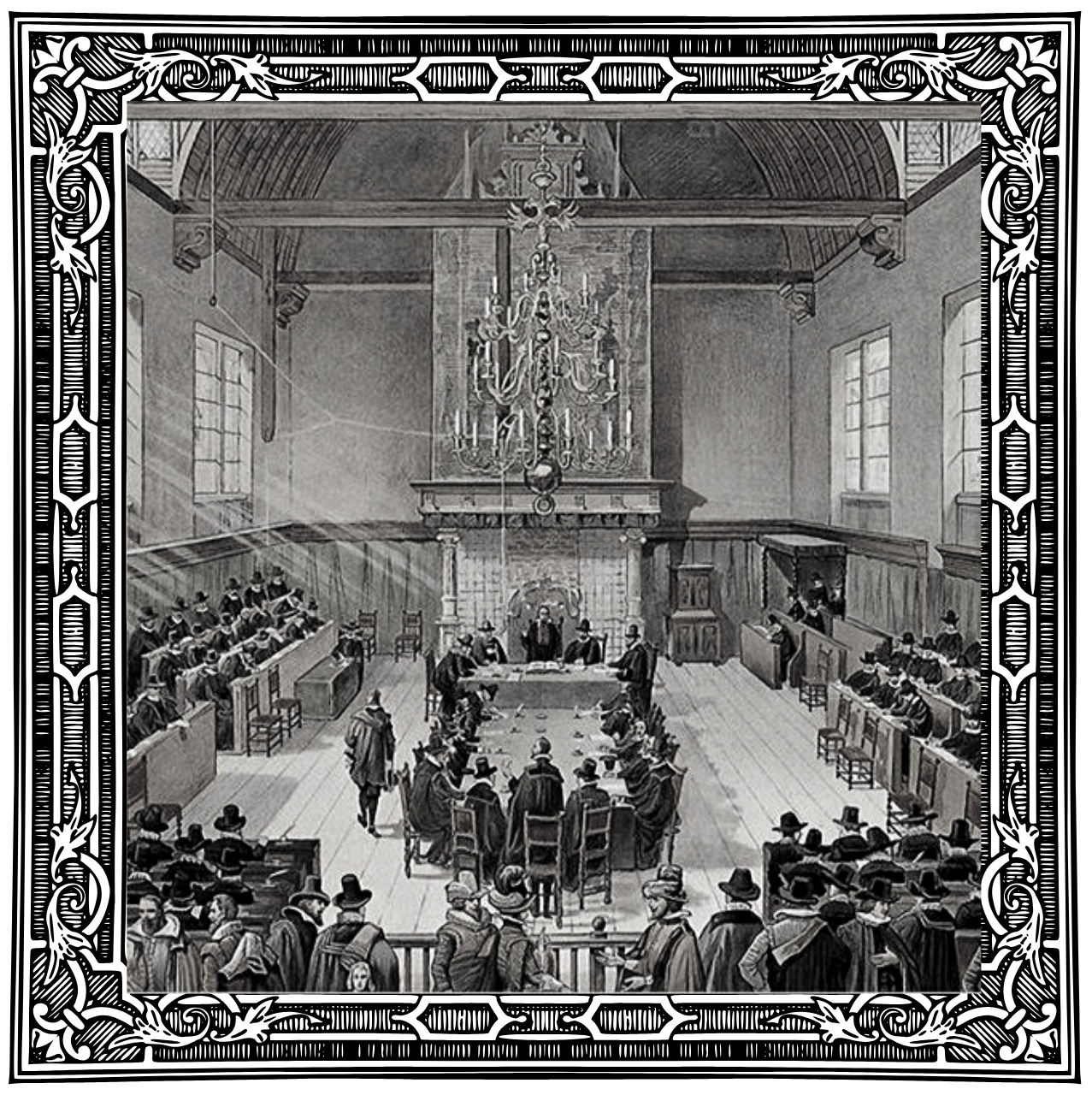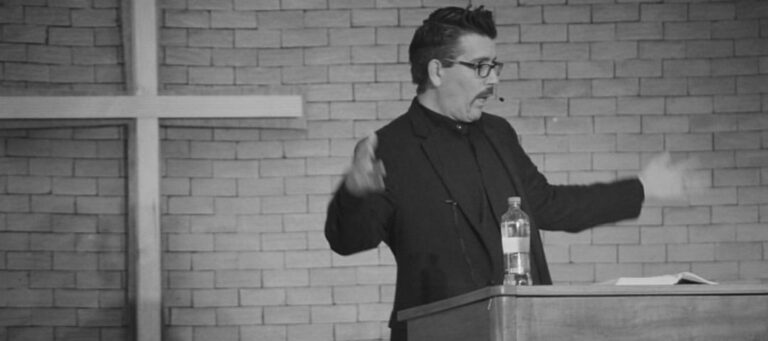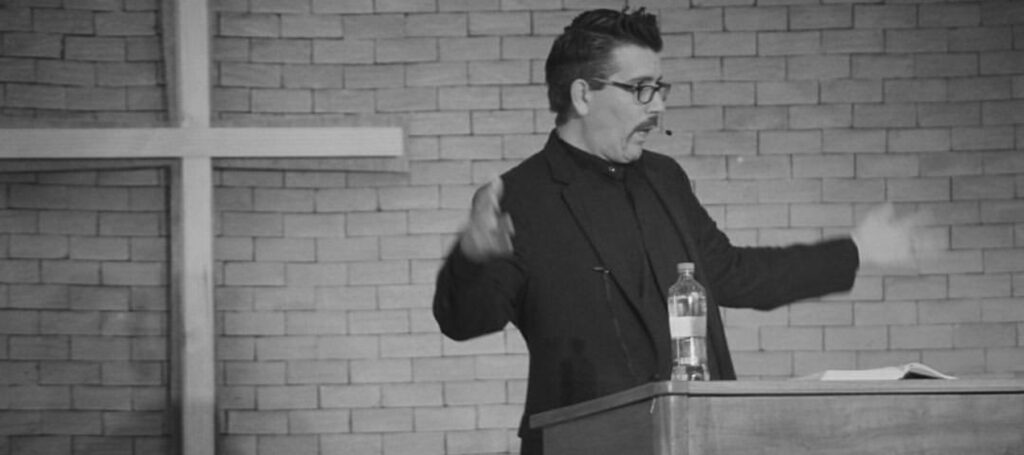“Give us 90 minutes and we’ll change your life.” So said the slogan of a church in Orange County. Churches adopt such slogans and methods because, they reason, we live in a fast-paced, visual society. To communicate the gospel, these churches too have become fast-paced with drive-up worship or streaming services. They too have become visual by exchanging sermons for multi-media and drama. But what about God’s visible media?
As Reformed catholic churches in this digital age, we too must face this cultural reality. How do we communicate to those outside the church and from such evangelical churches. Instead of turning to evangelical church growth experts, we already have the solution: the work of the Holy Spirit. He not only speaks through the means of audible preaching; he communicates through God’s visible media: the sacraments. After all, the sacraments are our God-approved, visible, and tangible drama. They make visible the audible Word. The sacraments are God’s method of meeting our need to see, touch, smell, and taste that he is good (Ps. 34:8). This is why John Calvin said, “The sacraments bring the clearest promises; and they have this characteristic over and above the word because they represent them for us as painted in a picture from life.”[1]
Pictures of God’s Covenant
John Calvin defined sacraments in terms of the biblical concept of a covenant. As author of the covenant, the Lord “seals on our consciences the promises of his good will toward us in order to sustain the weakness of our faith.” Then we as its recipients “attest our piety toward him.”[2]
As God’s visible media, the sacraments are pictures of the “mutual” covenant relationship between the Lord and his people. God not only binds himself to us, saying, “I will be your God,” but we in turn pledge allegiance to him, as the Lord says, “you will be My people.” Thus, every time the sacraments are administered, we partake in a visible covenant renewal ceremony, in which God “more fully declare[s] and seal[s] to us the promise of the Gospel” (Heidelberg Catechism, Q&A 66) and we make “confession of our faith and the Christian religion” (Belgic Confession, article 35).
This is the reason why the sacraments come where they do in worship. The preached Word is God’s audible media then as an appendix God’s visible media illustrates what was said. As I wrote before, “Good Liturgy is the Best Instructor.”
The sacraments “direct and almost lead men by the hand to Christ, or rather, as images…represent him and show him forth to be known.”[3] They portray Christ, the “true object” of the sacraments and the Mediator of the covenant (BC 33). This is why in his Short Treatise on the Holy Supper of our Lord Jesus Christ, Calvin used the simile of a mirror for the sacraments, when he said,
Now our heavenly Father, to succour us from it [our misery in the flesh], gives us the Supper as a mirror in which we contemplate our Lord Jesus Christ crucified to abolish our faults and offences, and raised to deliver us from corruption and death, and restoring us to a heavenly immortality.
With the baptismal font and bread and wine before us weekly, our eyes and hearts focus on Christ throughout our worship. Because of Christ’s blood we gather for worship. We sing because of his work for us. His mediation leads our prayers. These truths are literally before us in worship through God’s visible media in the sacraments.
Drama of God’s Covenant
Another aspect of God’s visible media is that they’re a drama of the covenant. God communicates to us his infinite mysteries in a way we frail humans can understand by accommodating himself to us. He portrays Christ’s redemption in a way we can grasp. Therefore he seals to us his promises because of the weakness of our faith. “Because we are of flesh,” Calvin said, the sacraments “instruct us according to our dull capacity, and to lead us by the hand as tutors lead children.”[4] This was explained in the Geneva Catechism. After the instructor asked, “Can you give me a reason why he so acts,?” the child responded,
In this way he consults our weakness. If we were wholly spiritual, we might, like the angels, spiritually behold both him and his grace. But as we are surrounded with this body of clay, we need figures or mirrors to exhibit a view of spiritual and heavenly things in a kind of earthly manner…At the same time, it is our interest to have all our senses exercised in the promises of God, that they may be the better confirmed to us.
This means the sacraments are another aid to our faith. They’re visible and dramatic aids to see and participate in. As we witness and participate in baptism, a person sacramentally dies. The waters crush everything that’s an enemy of God: the world (Ex. 14:28), flesh (Rom. 6:6), and Devil (Ps. 74:13-14; Col. 2:15). We also see God’s friends come out in resurrection life (Ex. 14:29; Ps. 77:19; Rom. 6). In Holy Communion, we see the body of our Lord upon the cross. We behold his shed blood to forgive our debts by the eye of faith. Communion literally unites us as many members partake of one loaf of bread (1 Cor. 10:17). We experience a foretaste of the marriage supper of the Lamb. On that day all tribes, tongues, languages, and nations will be joined at one table (Rev. 19).
Application to our Churches
The sacraments communicate God’s relationship with us in an accommodated way. He knows of our feebleness, tendency to doubt, and inability to grasp his promises. How does this understanding of God’s visible media speak to those to whom we desire to minister?
Frequency
The most obvious way is in the frequency of administering the sacraments. G.C. Velthuysen said,
In a church, priding itself on the fact that it honors the theological heritage of Calvin, the sacraments should therefore occupy the place of honour he accorded them…they will be joyfully embraced as powerful organs of the Spirit, ministries by which the promises given in the Word are underlined and accentuated.[5]
Many who worship in our churches are bored; many times for good reason! The “frozen chosen” can be apt since our services so focus on the ear to the neglect of the eye. We keep ourselves from frequently receiving God’s promises in their clearest way in the sacraments, which “better […] present to our sense both that which He declares to us by His Word and that which He works in our hearts” (BC 33). It’s one thing to hear God say, “I will be your God, and you will be My people;” it’s quite another to eat it “from the hand of the minister!” (HC 75) God knew what he was doing. He gave the Word to create faith in our hearts and the sacraments to confirm it (HC 65). As with the preached Word, so the tangible word should be set before us “at least weekly.”[6] Frequent communion speaks to our visually stimulated culture as they are God’s dramatic portrayal of redemptive history before their eyes. God has written his own drama and we need not only to speak it, but to see it.
Piety
The sacraments also re-orient our piety—our grateful devotion to God. They move us from self-centeredness to community-centeredness. By the visible words “we are moved…to a fervent love of God and our neighbor” (BC 35). We go out of our way to divide and sub-divide the church family. Personal devotional times, weekly age- and gender-specific groups, and small groups. Yet Communion does something these can’t. At the Table we experientially become “the one bread” (1 Cor. 10:17) as we see our fellow brothers and sisters partake of the one loaf just as we. True affection and Spirit-created unity should flow from mutual reception of Christ’s crucified body and shed blood.
Preaching
Our sacramental theology also effects our preaching to be more evangel-centered. Weekly administration of the Lord’s Supper means a preacher must move his sermon towards a gospel climax. Both Word and sacraments are “designed to direct our faith to the sacrifice of Christ on the cross” (HC 67). The clarity of the sacraments challenges ministers to preach the Gospel even clearer. Tangible sacraments causes more vivid preaching. I must publicly portray Christ as crucified before my congregation (Gal. 3:1). We’re so pathetic in our day-to-day evangelism. I think it’s partly due to the fact that we don’t necessarily hear the gospel for us every Lord’s Day. I’m convinced that experiencing God’s precious promises every week in the multi-sensory Supper leads to more of the Gospel’s power in our lives. This would then effect confidence in us for its power for our neighbors. We do not need evangelistic programs because we have the visible pictures of Christ crucified in our hands as ministers. Every service with the Table spread includes the call to repentance from sin and faith in the Lord Jesus Christ. This necessarily goes out to all in attendance. Knowing unbelievers may be in our midst forces us to explain clearly the significance of what they’re seeing. It ensures we explains what they can’t partake of—yet—and what they need to do to join us!
Conclusion
In his wisdom God knew we needed another means to receive his promises. We need a means to stimulate all our senses with his grace and mercy in Christ. Our forefathers understood this. They viewed the Lord’s Supper as God’s visible media applying the preached Word. Calvin taught the importance of “at least weekly” communion” notwithstanding the Geneva city council’s prohibition.
We don’t have city councils telling us how to order our worship. We have a plethora of ministers unlike o0ur forefathers’ time. Let’s re-capture our Reformed belief about the sacraments. They benefit us by drawing Christ’s sheep closer to him and to each other in a tangible way. Sacrament are occasions to invite the world into God’s drama of sin, salvation, and service. God’s visible means provide a place “at which Christ communicates Himself with all His benefits” (BC 35).
[1] Institutes, 4.14.5.
[2] Institutes, 4.14.1.
[3] Institutes, 4.14.18.
[4] Institutes, 4.14.6
[5] G.C. Velthuysen, “Ministries of the Spirit: Calvin on the Sacraments,” in John Calvin’s Institutes: His Opus Magnum (Potchefstroom: PUCHE, 1986), 351.
[6] Institutes, 4.17.43, 46.







